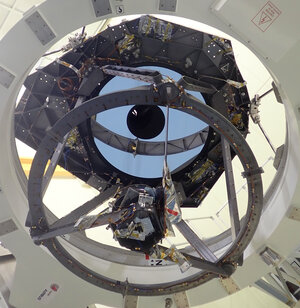

Agency
The eye of Euclid
Euclid will capture light from distant galaxies using a set of mirrors, the biggest of which measures 1.2 metres across. The mirror is made of one of the hardest materials ever known – silicon carbide. On Earth, silicon carbide was first produced as an artificial diamond substitute.
Making the mirror was a tricky process: silicon carbide powder was squeezed into a soft circular block, which was then precisely shaped before being baked at 2100°C, then coated with more silicon carbide. The final mirror is smooth to nine millionths of a millimetre under Earth gravity.
Euclid’s 1.2-m diameter main mirror, seen during assembly, integration and testing.





